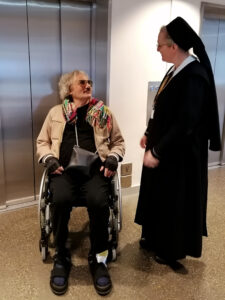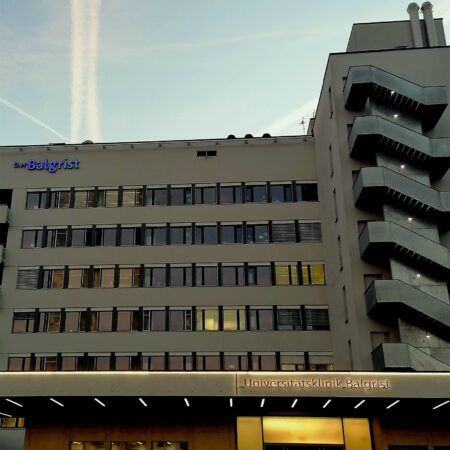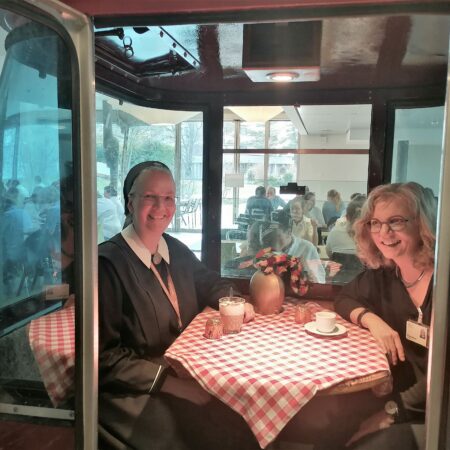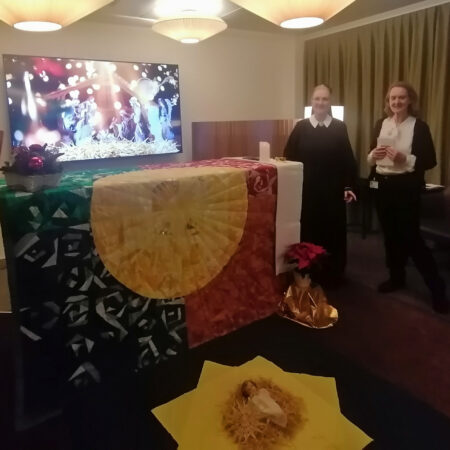A Heart That Has Ears –
– Part I –
For half of a year I have been living and working in the city of Zurich. I like to take various routes through the city when I leave my two-room apartment. In the morning, I take the tram (streetcar) to a church for Holy Mass. Later I take the tram or bus to work or to go shopping.
State of the art medical and spiritual care
I am employed as a Schoenstatt Sister of Mary by the Catholic Church in Zurich to do pastoral care in two flagship orthopedic clinics. I encounter some people in these clinics who are happy about a successful surgery. Others are surprised by a life-changing diagnosis.
Still others whom I meet have a long history of suffering or are fearful before a surgery. In the so-called Pastoral Care department we accompany people who have an illness or are nearing death in their physical, psychological, and moral needs. In addition to the physical, psychological, and ethical dimensions, the focus of our treatment of the patients is the spiritual dimension. Often this care extends to relatives and friends [of the patient.
With an open ecumenical and interreligious attitude, my Reformed colleague and I support the people who have spiritual and religious questions. On the one hand, I seek out the Catholic patients but I also meet with other patients regardless of their denominational affiliation. On the other hand, the patients themselves, relatives, nurses or the medical staff might ask for the pastoral care.
When eyes “speak” and the “sun rises”
In the rehabilitation clinic I meet paraplegic and tetraplegic (complete paralysis) men, women, and youth who are in a wheelchair for a limited time or permanently. They are competently accompanied by a team that consists of nursing staff, specialists, psychologists, and therapists. Through difficult therapy, the paraplegic and tetraplegic learn to manage their everyday life and to achieve as much autonomy as possible. A visit or the accompaniment of someone from the pastoral care team is a welcome change and an important complement [to their other care]. Sometimes a joke or multiple encounters while passing in the clinic become a “door opener.” A conversation with the pastor or the Sister of Mary usually ends on different level than a conversation with of the doctors and nurses. An accident, an illness, changes ones perspective on life— in addition to their work of recovery, spiritual and existential questions arise. Patients who are at home in their faith particularly appreciate a visit and a conversation, and they especially appreciate praying together. But even patients who have little faith or are on their way to faith have longings and questions that reach beyond what is visible and practical. “Nice of you to come – when you are here the sun shines in this room!” This is how I was once greeted by a patient who described himself as non-religious.
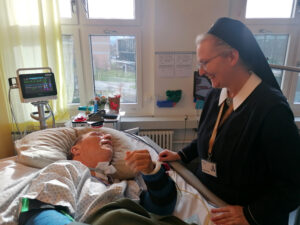
Dealing with doubts and questions
There is, for example, Mr. S who fell down the steps in his home and was in the rehab clinic for months. Right from the start we got along, although, as he emphasized, he no longer could believe in God. In the truest sense of the word, we talked about God and the world. A sports enthusiast, he never missed the World Cup or a ski race—normally he allowed no disturbances during these events, but when I came the television could be shut off. I helped him deal with his doubts and questions. In time, I prayed with him and for him–at his request. Thus we often asked for God’s blessing at the end of a conversation. After every visit, Mr. S. happily told his relatives that sister had visited him again. We both hoped for his return home and were deeply saddened when our hopes were dashed. Mr. S. died on February 2. During these regular visits, conversations also took place with his relatives and they, too, were assisted in the process of saying goodbye. I still am in contact with his daughter and his wife.
Usually a joke will lighten the atmosphere
Often the inpatient stay in the orthopedic clinic is very short—only three or four days. When I enter a room as a Sister of Mary, the patients react in very different ways. Some are spontaneously happy, others are irritated initially. This is not only because of my dress as a religious sister, but rather by the fact that they are visited by someone from the hospital chaplaincy.
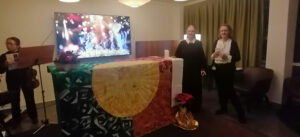 Some patients realize that they scarcely practice their faith or believe in God. Usually a joke or asking how they are doing lightens the atmosphere. They begin to talk—often telling little stories about why they no longer attend Church services or believe in God. Valuable moments arise in which questions about the meaning of life and about faith are discussed. In my case, this is due, not least of all, to the effect of my clothing as a Schoenstatt Sister of Mary.
Some patients realize that they scarcely practice their faith or believe in God. Usually a joke or asking how they are doing lightens the atmosphere. They begin to talk—often telling little stories about why they no longer attend Church services or believe in God. Valuable moments arise in which questions about the meaning of life and about faith are discussed. In my case, this is due, not least of all, to the effect of my clothing as a Schoenstatt Sister of Mary.
No, the sister should come!
A woman became very frightened when I entered the room. But actually, I had come to visit the other persons in the room. After I finished talking to the other two patients, the woman began to talk to me. Somewhat shyly, she asked if I would visit her the next day. Over a long period of time, an intensive, valuable friendship developed with this patient who had left the Church. When she returned to the clinic two months later, she said that she would like to be visited by the chaplain. The nurse said, yes, the Reformed chaplain was there and that she would tell her right away. But the patient said: “No, Sister should come! It doesn’t matter if she can’t come until Monday.”
– To be continued –
